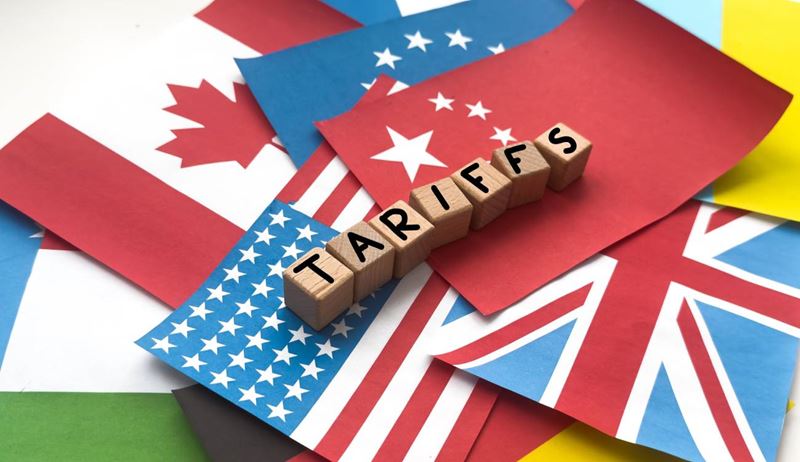
This article is for general guidance only and is not financial or professional advice. Any links are for your own information, and do not constitute any form of recommendation by Saga. You should not solely rely on this information to make any decisions, and consider seeking independent professional advice. All figures and information in this article are correct at the time of publishing, but laws, entitlements, tax treatments and allowances may change in the future.
Shockwaves have been sent through the global economy after President Trump announced sweeping new tariffs on imports into the US from countries around the world. The tariffs have already come into effect, and stock markets have reacted nervously amid fears of a trade war.
But what could this mean for your money?
A tariff means a tax added to imported goods. Trump’s tariffs impose an extra charge of between 10% and 50% on products imported into the US, with the average rate around 24% (unless there are further changes). If companies choose to pass on the rising costs, it means American buyers will have to pay more for goods made overseas. So, a 30% tariff on a $10 product would mean a $3 extra charge. US companies may pass the cost to customers, absorb it, or reduce imports.
Dan Coatsworth, an investment analyst at AJ Bell, says economists are currently tearing up their forecasts for global economic growth. “We’re now in a game of ‘who blinks first’ as recipient governments work out their response. Given this chaotic backdrop, it’s no surprise that financial markets have veered off course.”
The UK has got off comparatively lightly with a 10% tariff – the minimum level, and less than the 20% tax imposed on the EU – but it is likely to still affect our economy.
If UK companies that currently export the US lose trade, for example if US demand for their goods falls or if buyers switch to US companies, job losses could follow. There is also an extra 25% tariff on steel and cars.
This will raise costs, reduce demand and put pressure on big UK firms such as BAE Systems, Jaguar Land Rover and Diageo. One in eight cars built in the UK is exported to the US.
While medicines are currently exempt from the tariffs, Trump says he plans to change that. This has already affected the stocks of UK pharmaceutical companies such as GSK and AstraZeneca, which sell heavily to the US. Raw ingredients for medicines tend to cross back and forth between China, India, the UK, US and EU, so could be hit with multiple tariffs. The UK health secretary Wes Streeting has also warned of possible medicines shortages.
There is a chance that the UK could benefit if some companies look to route exports through the UK to avoid higher tariffs elsewhere.
The overall impact remains difficult to predict, but the uncertainty alone can unsettle markets. The FTSE 100 lost 10% of its value within days, in the biggest falls since 2020.
Stock markets around the world have similarly suffered losses, with rollercoaster ups and downs along the way. That can affect your investments, pensions and long-term plans.
There’s also a chance that the high US tariffs on China (and other countries) could mean that over the longer term, Chinese and other firms which have lost some of their US market instead decide to increase their exports to the UK. Nick Glynne, chief executive of the online discounter Buy It Direct Group, told the BBC that Chinese manufacturers are already “selling over the head of importers... and selling directly to UK consumers”. This could have a damaging impact on UK firms that currently import from China.
When it comes to cash, there is little you need to change in response to Trump’s trade tariffs. Cash offers stability in uncertain times, and it is sensible to ensure you have access to some for costs in the immediate future.
As a rule of thumb, keep three to six months of expenses in cash if you’re working, and up to three years if retired. This should mean you avoid the need to sell investments or draw down your pension during a market dip.
Get the cash savings you have working as hard as possible by checking you are getting the best interest rate possible. Use your annual £20,000 ISA allowance to avoid paying tax on your returns.

If there is one thing stock markets hate, it’s uncertainty. Anyone with money invested in the UK or global stock market funds, either directly or through a pension or stocks and shares ISA, will notice some short-term ups and downs.
But the key is not to panic. Volatility is normal in investing and markets have a long history of recovering.
Susannah Streeter, head of money and markets at Hargreaves Lansdown, says that to shield themselves as much as possible, investors should ensure they are well diversified, without too much concentration on a particular market, and with money spread across different asset classes and geographies.
“The strategy of drip-feeding investments can pay off in uncertain times. It means investors may be able to take advantage of lower prices and benefit during a recovery, to help smooth out sharp market movements over the longer-term,” she adds.
The impact that Trump’s tariffs could have on your pension depends on the type of pension you have. Jason Hollands, managing director at wealth management firm Evelyn Partners, says that defined benefit pensions should be largely unaffected as their payouts are mostly fixed and guaranteed.
If you have a defined contribution pension – used by most private workplace pensions and SIPPs – your money is invested in the markets and there could have been some alarming slumps in value over the past couple of weeks.
Helen Morrissey, head of retirement analysis at Hargreaves Lansdown, says it’s important not to panic. “Pensions are a long-term game and over the years, periods of market upheaval are to be expected.
“Making knee-jerk reactions such as changing investment strategy or cutting back on contributions can crystallise losses and make it harder for your fund to recover and this can impact your retirement income.”
If you’ve already retired and are drawing from your pension, it may be wise to reduce your exposure to riskier assets, such as shares. Bonds, cash or money market funds are typically lower risk funds than shares.
That way, if the stock market drops just as you need the money, you won’t be forced to sell your investments at a loss. Instead, you can draw income from the safer part of your pension while waiting for the riskier investments to recover.
That said, there are different attitudes to investment risk and some investors are arguing that the falls that many stocks have already seen in recent days mean that this is a good time to buy.
You could consider using some of your pot to buy an annuity to guarantee you an income in retirement. “These are offering good value right now,” says Morrissey, with some rates at their highest level since 2012.
Yes, potentially the trade tariffs could make goods more expensive, especially if the UK reciprocates. Unless other goods become cheaper, inflation would rise as a result. This means rising costs on things like consumer goods and medicines, sending the cost of living even higher.
The Bank of England has a remit to keep inflation rates low. So higher inflation might lead it to hold off on interest rate cuts that have been widely predicted to come this year, since higher rates discourage spending, which in turn helps to reduce inflation.
However, if business confidence suffers because of the tariffs, then the Bank might choose to cut interest rates more than they would have done otherwise, to encourage spending. Higher interest rates are good news for savers (although high inflation can devalue your savings), but can mean your mortgage becomes more expensive.
And there are other factors affecting mortgage rates too. “While savings rates might be more tied to the BoE’s benchmark rate, mortgage rates tend to be influenced also by bond yields. Global economic uncertainty can cause bond market volatility, so that’s an added variable that could swing mortgage rates,” says Hollands.
Having a clear plan and reviewing it regularly is one of the best ways to stay in control, even when the headlines test your nerves.



Many people haven't heard of stocks and shares ISAs, and many more are unsure how they work. Are you holding your finances back? Find out more.

Find out what might happen to interest rates and what else you should consider.

